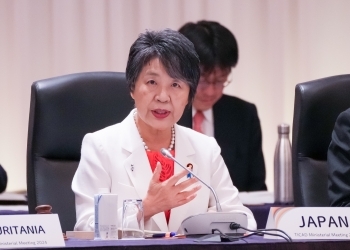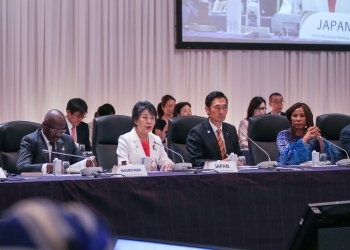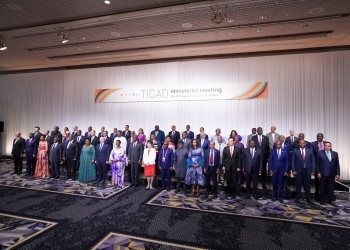Press Releases
Tokyo International Conference on African Development (TICAD) Ministerial Meeting (Day 1: Opening Session, Session 1, Session 2)



On August 24, 2024, Ms. KAMIKAWA Yoko, Minister for Foreign Affairs of Japan, attended the Opening Session as Co-Chair of the TICAD Ministerial Meeting at Hotel New Otani, together with Mr. FUKAZAWA Yoichi, Parliamentary Vice-Minister for Foreign Affairs, from 2 p.m. for about 25 minutes. In addition, Minister Kamikawa and Parliamentary Secretary Fukazawa attended Plenary Session 1, which started at 2:35 p.m. and lasted for about 1.5 hours, and Parliamentary Vice-Secretary Fukazawa attended Plenary Session 2, which started at 4:30 p.m. and lasted for about 1 hour and 35 minutes. The TICAD Ministerial Meeting was attended by 47 African countries, as well as international organizations, business representatives, member of the Diet, representatives of civil society organizations, and others.
1. Opening Session
- At the Opening Session, Minister Kamikawa stated that Japan has supported Africa's development through the TICAD process, which has a history of over 30 years, under the fundamental concepts of African ownership and international partnership and with a particular emphasis on human resource development. She spoke of her intentions to build on previous achievements at this ministerial meeting, and also to hold discussions with a view towards Africa of the future as a global growth center of radiant individuals. She expressed her intention to carry over the achievements of the meeting not only to next year’s TICAD 9, but also to the UN Summit of the Future as well as the G20, which will be chaired by South Africa next year. Furthermore, Minister Kamikawa stated that the theme of this ministerial meeting is “Co-create innovative solutions with Africa” and that she intends to bring together innovative solutions created by various actors and spread examples of good practices to the whole of the African continent, aiming for concrete results at TICAD 9 next year. She expressed her hope to broaden the scope of discussions during the three sessions on society, peace and stability, and economy by putting focus on three perspectives: future-oriented problem solving, youth and women, and connectivity and knowledge platforms. Referring to the six thematic events that were held alongside the ministerial meeting by civil society and international organizations, Minister Kamikawa stated that cooperation between diverse participants beyond the bounds of the government is an aspect that TICAD takes pride in. To conclude, Minister Kamikawa expressed her hopes that the participants would actively share their ideas and experiences, engaging in discussions as they jointly envision the future of Africa.
- H. E. Dr. Mohamed Salem MERZOUG, Minister of Foreign Affairs, African Cooperation and Mauritanians Abroad of the Islamic Republic of Mauritania, the Chair of the AU, then stated that Africa has rich human and natural resources and is an important partner, but that it has limited development funds and it needs support from the international community to solve issues in the areas of digital infrastructure, communications, connectivity enhancement, education, health, human resource development, and women's empowerment. He also stated that it is necessary to promote reform of the UN Security Council and international financial institutions to ensure that African voices are duly reflected in the international community.
- H.E. Dr. Monique NSANZABAGANWA, Deputy Chairperson of the African Union Commission (AUC), then stated that Japan and Africa are responding to Africa's needs including Agenda 2063 through dialogue, and that she sees potential in Japanese companies’ investment in Africa. She further stated that the AUC is committed to contributing to the TICAD process towards the co-creation of innovative solutions.
2. Session 1 (Society: “Realizing a Sustainable Future”)
- In Session 1, which focused on the theme of society, Minister Kamikawa expressed her intention to cultivate the youth who would lead the future of Africa and announced that she would advance people-to-people, intellectual, and cultural exchanges to promote the co-creation of solutions to various problems by Japanese and African youth towards the “realization of a sustainable future.” Minister Kamikawa also pointed out the importance of cooperation that employs science and technology, citing examples of solutions to social issues that emerged from collaboration between Japan and Africa in areas including maternal and child health, the environment, and climate change. She highlighted the potential of “Made with Japan” cooperation in contributing to solutions to African issues in innovative ways by harnessing local Japanese technology and ideas from Japanese youth, with the aim of co-creating solutions to African challenges jointly between Japan and Africa.
- This was followed by an opening statement by Mr. Andrew DABALEN, African Region Chief Economist of the World Bank, a Co-Organizer. Presentations were then made by two guest speakers (Dr. Tshilidzi MARWALA, Rector of the United Nations University, and Ds. Magda ROBALO, UHC2030 Co-Chair Steering Committee) and three lead speakers (representatives of Malawi, Zimbabwe, and Cabo Verde), followed by remarks from African participants, in which they discussed supporting the activities of women and youth, the promotion of SDGs, and the co-creation of solutions to challenges in areas such as health, education and human resource development, environment and climate change, agriculture, energy, industrialization, finance, and use of technology including digital technology. Finally, Mr. Jean-Paul Adam, Director of the United Nations Office of the Special Advisor on Africa (UNOSAA), a Co-Organizer, made a concluding statement.
3. Session 2 (Peace and Stability: “Ensuring Human Dignity and Human Security”)
- At the outset, Parliamentary Vice-Minister Fukazawa presented three perspectives on “Ensuring Human Dignity and Human Security”. First, he addressed the mainstreaming of “Women, Peace, and Security” (WPS) for peace and stability, and announced the launch of the new “Women's Peace Human Resource Development Initiative in the Horn of Africa” based at the Intergovernmental Development Organization (IGAD), which aims to realize sustainable peace through the participation of women. Secondly, he mentioned coordination in the areas of humanitarian aid, development, and peace underpinned by innovation, and announced the development of a Mine Action Platform in Africa, which will provide counter-mine technology and know-how. Thirdly, he addressed Africa’s own efforts towards peace and stability, and stated that good governance and the strengthening of the rule of law by Africa itself are essential not only for achieving peace and stability in Africa, but also for solving social problems and achieving economic growth. He also highlighted the importance of reforming the UN Security Council to better reflect African voices in the international arena and called for further cooperation.
- Following the opening remarks by Mr. Bankole Adeoye, Commissioner for Political Affairs, Peace and Security of the AUC, a Co-Organizer, as well as presentations by the guest speaker (Ms. Bineta DIOP, AU Special Envoy on WPS) and three lead speakers (representatives of Egypt, Nigeria, and Mauritius), the following issues were discussed: the importance of promoting WPS, maritime security, human security, terrorism, preventing and addressing the root causes of conflicts, efforts to combat organized crime and illicit finance, efforts to nurture women and youth leaders and promote their participation in decision-making in peacebuilding and reconstruction, knowledge sharing, African ownership, humanitarian aid and development and peace, the role of communities, the importance of ensuring peace as a prerequisite for economic growth, and investing in human resources. Finally, Ms. Afuna EZIAKONWA-ONOCHI, Assistant Administrator and Director of the Regional Bureau for Africa at the United Nations Development Programme (UNDP), a Co-Organizer, gave her concluding remarks.
(Reference)
Opening Session : Statement by Minister KAMIKAWA (English (PDF)  / French (PDF)
/ French (PDF)  )
)
Session 1 : Statement by Minister KAMIKAWA (English (PDF)  / French (PDF)
/ French (PDF)  )
)
Session 2 : Statement by Parliamentary Vice-Minister FUKAZAWA (English (PDF)  / French (PDF)
/ French (PDF)  )
)
Progress Report of Japan’s Contribution to Africa following TICAD 8 (English (PDF)  / French (PDF)
/ French (PDF)  )
)

